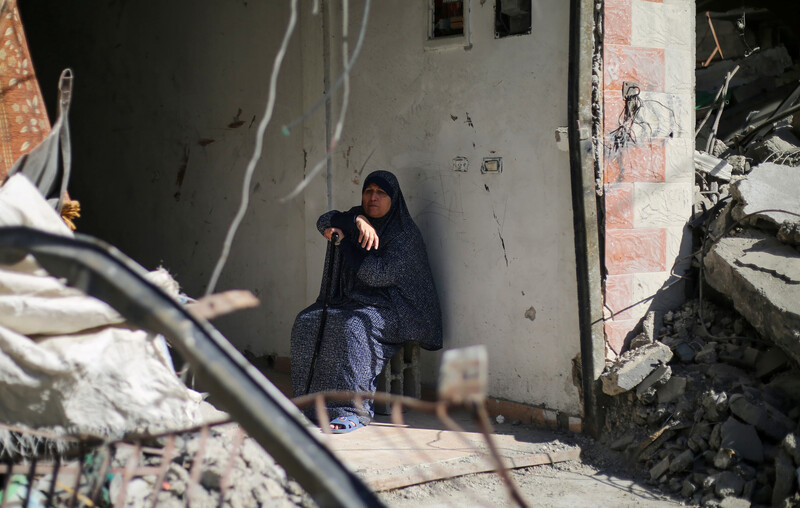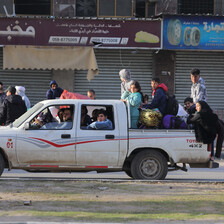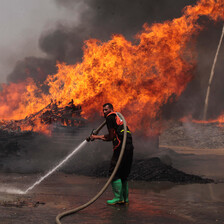The Electronic Intifada 1 December 2023

Women are particularly vulnerable as a result of the collapse of the health sector in Gaza. Here, a woman sits in the entry of a bombed out building in Jabaliya camp, one of the hardest hit areas in Gaza.
APA imagesWhile scrolling through the news, I came across a report about 41 Indian miners who had been rescued after being trapped in a tunnel for over two weeks.
I felt a sense of relief for them, prompting me to compare their situation with what we have witnessed here in Gaza. Recently, amid a four-day truce deal that has now been extended, people have begun the painful task of searching for the bodies of their loved ones.
Here in Rafah, where I am currently seeking shelter, there is a house with a poignant message written on its wall: “Omar and Osama are still under the rubble.”
I paused for a moment and pondered. Did they meet a quick end, or did they endure unimaginable suffering? Did they call out for help? Is it possible that they initially survived, but died after being trapped under the rubble for more than a week?
I have a schoolmate named Aya Juaidi, who is 29 years old and tragically lost her husband in the Israeli massacre at Al Taj Tower III in Gaza on 25 October. Heartbreakingly, his body has remained trapped within the building even after the horrific event. Even if the civil defense services had fuel, they still wouldn’t have the necessary tools to dig out bodies from the rubble.
Mohammed Sawwaf, another colleague, is a visionary filmmaker from Gaza. He has produced several remarkable documentaries that shed light on life in Gaza, including The Palestinian Prison Break and Eleven Days in May. I often seek his advice and guidance in my own work.
During the war, Mohammed suffered injuries twice. The first incident took place in mid-November. The second involved his extended family, which resulted in the loss of his parents, two brothers, their families, and 46 other relatives. Mohammed faced the heartbreaking reality of being unable to rescue his family members from the rubble.
“Since the first day of the Israeli massacre against my family,” Mohammed said, “the remaining family members have gathered daily to personally excavate the ruins of their house with the limited tools available to them. They are determined to retrieve and bury the bodies of the martyrs.”
Despite their efforts, Mohammed’s aunt and his 9-year-old cousin are still missing, two weeks since the bombing.
No safe space
Prior to the announcement of the truce deal, my Facebook feed was and is still filled with pleas from individuals calling on the International Committee of the Red Cross and the Palestinian Civil Defense and ambulance services to rescue their trapped family members.
Many people expressed frustration, claiming that the ICRC had been complicit by not offering assistance to Palestinians trapped under rubble. They questioned why the same level of attention and support was not being given to them as was provided to Israeli hostages and prisoners during the truce.
This month also witnessed the brutal shooting of three Palestinian college students in Vermont. It is disheartening to think that Palestinians abroad, despite their deep concern for our situation, may also feel limited in their ability to actively defend our rights.
We understand that it is unsafe in our own country because of the occupation. But apparently, even if you are studying abroad or working abroad, you are not safe either.
The shooting came around Thanksgiving. When I was in the US, I used to enjoy this holiday, even though I’m not a fan of turkey. I always looked forward to pumpkin pies and gatherings with friends and professors.
I remember being invited to dinner by my American friends, and I took the opportunity to explain our communal traditions to them. We often have lunch with family members, especially on Fridays. We share laughter, food, conversations, and enjoy drinks like mint tea in the summer and maramiyeh during the winter.
At this moment, none of that is possible. I am unable to have a single meeting with my family, even virtually. We face severe challenges. We lack electricity, internet access, and our telecommunication infrastructure has been greatly affected by the bombings. Whenever I need to call my brother, I have to make countless attempts before the call goes through due to the damaged Paltel telecommunication routes.
Soul of my soul
November sees the annual start of the “16 Days of Activism,” an international campaign that runs from 25 November (International Day for the Elimination of Violence against Women) to 10 December (Human Rights Day).
The primary objective of this campaign is to raise awareness and promote action to combat violence against women and girls on a global scale. Throughout these 16 days, various international non-governmental organizations in Gaza engage in activities and initiatives aimed at advocating for gender equality, addressing violence against women, and empowering survivors.
While this campaign holds significance in many contexts, I feel compelled to express my concern regarding the portrayal of men and fathers solely as sources of brutality. Fathers, too, experience profound anguish over the suffering of their wives and daughters.
I vividly recall watching heart-wrenching footage of a man holding his lifeless daughter’s body, while repeating the words: “She was the soul of my soul.”
It is evident that women face a myriad of challenges, particularly when it comes to a lack of protection, which can be attributed, in significant part, to the Israeli occupation.
During this war, many women have been forcibly displaced. Over half a million women are currently grappling with critical gaps in healthcare, specifically pertaining to menstruation, pregnancy, lactation, and sexual health needs.
Women face a scarcity of menstrual health products, limited access to clean water, inadequate medical resources for pain or infections, long lines for toilets, and a lack of privacy. All of these factors undoubtedly have long-term effects on women’s health.
Adding to this, more than 160 women in Gaza give birth every day without proper hospital care, essential medicines, or electricity. These circumstances paint a stark picture of the challenges faced by women in the Gaza Strip at the moment.
A friend of mine, who sought shelter at a school in the Jabaliya refugee camp in northern Gaza and has always been an advocate for women’s rights, recently reached out to me. Initially, I had feared the worst, as she had not been responding to my messages. However, she shared with me the dire conditions they were experiencing, including the lack of clean water.
“Ghada, I cannot even recall the last time I was able to take a shower.”
My friend, who is battling uterine cancer, told me that while she had no chemotherapy session scheduled for the month, she could also not secure the medication she needs.
“The pharmacist provided me with alternative medication for which I am solely responsible. I’m afraid it may have unforeseen side-effects.”
Ghada Abed is a journalist based in Gaza.





